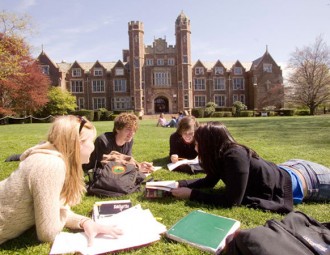Andrei Rolenok: Despite political risks, the National University should be established in Belarus

Only in this case the university will be able to lay claims to being an alternative to the EHU; thus, the already existing initiatives should unite to form a strong institution.
Discussion about the formation of the National University is becoming more heated. Let us recall that more than fifty culture figures and bright civil society representatives put their signatures under the statement about the formation of the National University. This document broadly advertised by non-state media was very short, but the list of signatories was much longer: from Sviatlana Alexievich, a writer known worldwide and famous musicians Zmicier Vaitsiushkevich and Kasia Kamotskaja to the former Belarus’ leader Stanislau Shushkevich.
The idea of the project was initiated by Aliaksandr Milinkevich, the leader of the movement “For Freedom”, who lost the recent elections of the EHU’s head and who believes that EHU will no longer serve Belarus.
How European should the Belarusan University be? What should it look like? Who should be responsible for it – intellectual community or particular politicians? Will the university in exile be useful for our country or should we create it in Belarus? Is its territorial location secondary or not? What community should stand behind such university? Will it compete with the EHU or unite modern education projects? What development strategy does the university need, and who is to define it?
And finally, is the establishment of the National University an attempt to create a structure that will immediately attract 100 thousand students or is it rather a model that could be then transmitted to other education institutions? We are trying to find answers to these questions together with the representatives of the academic community of Belarus.
Belarus has been dreaming about the main university of the nation since 1991. But where should we look for its origins – in Vilnius of the 16th century or in partisan dugout of 1994? What can one learn in Frankfort on the Oder and in Slubice, and why does campus need walls? Aliaksei Kryvalap, once dismissed EHU teacher, candidate of culturology has already told why the National University cannot be established from nothing.
Before that the issues such as whether Belarus needs another university abroad were discussed with Tatsiana Vadalazhskaja, the coordinator of the Flying University, candidate of sociological sciences, with Uladzimir Dunaeu, professor of philosophy, a former Vice Rector of the EHU, the member of the public Bologna committee, and with Sviatlana Matskevich, an expert of the Agency of Humanitarian Technologies, the candidate of pedagogical sciences.
Today his vision of the model of the National University with the “EuroBelarus” Information Service shares Andrei Rolenok, the teacher of the EHU’s philosophical department that fell under the wave of layoffs.
- Yes, of course, I am familiar with this “statement of the 57”, unless the list of signatories changed. Among them are my colleagues with whom I was working in the EHU. All they come from different generations and also from different waves of repressions. This is the team of Andrei Kazakevich, professor Ales Smalianchuk, as well as the latest wave of repressions – Andrei Lavruchin, and Pavel Tserashkovich. Other famous and respected people among the civil society environment also joined them.
In general, the initiative about the establishment of the National University seems right to me. The question is why it remains at the level of declarations. I hope that it not only collected enough signatories, but will also have enough human resources, strategic and tactical vision of how to do it.
How essential is this university to Belarus? In general, our country obviously lacks modern universities and education projects within these universities, especially in the context of political situation. The only thing is that I wish such universities existed not only outside Belarus, but also in complicated political realms inside the country.
I think that we have initiatives that are moving towards this direction – certain education projects. And, perhaps, it is about time for them to unite and become something that pretends to be a university – a Flying University or anything else! The main thing is that they move towards the formation of a strong, formal institution in Belarus.
Do we need one more university in exile apart from the EHU? I am skeptical about the message that the new university will become a competitor to the EHU in exile. I think that the real competitors for the EHU are education programs that are supporting the education of our students abroad.
Students can also lay claims for grants, choose particular universities for further education to come back to Belarus later already being a professional. It has strategic effect and looks more imposing than the establishment of one more university in exile.
Despite all the risks – political and so on – the right decision would be to try and establish such university in Belarus. Then it can really lay claims for being an alternative to EHU owing to its “Europeanism” that has been declared as the value of this project. It would really be introduced from inside, if territorially the university was situated in Belarus.
-
03.01
-
07.10
-
22.09
-
17.08
-
12.08
-
30.09



























